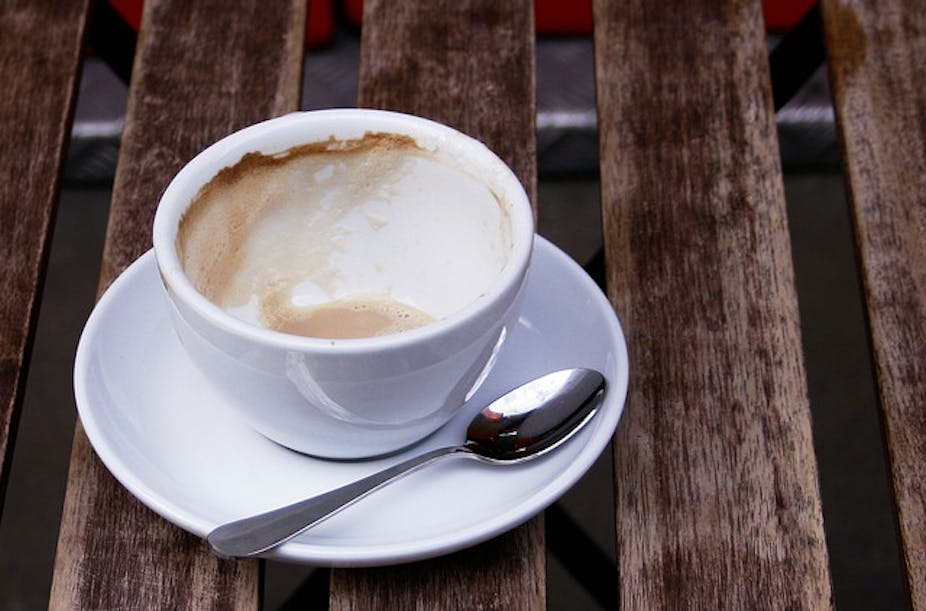Many Australians begin their day with a cup of coffee. It’s widely viewed as a tonic with revitalising properties – each cup making us feel better. But this isn’t the same as being good for our health.
Coffee is the most widely-used stimulant in the world, with Australians consuming more than 3kg of coffee per person every year. Most of this is instant coffee, drunk at home (about 80% of total consumption) but cafe coffee is on the rise.
Coffee is a deliciously complex mixture of different compounds that come from the bean, as well as those generated or excluded in the processes of fermentation, roasting and brewing.
Some of coffee’s phytonutrients (organic components) may theoretically be beneficial for human health, including antioxidants, lignans and minerals. Others, such as acrylamide, are toxic chemicals.
But the most well-known component is, by far, caffeine and each cup of instant coffee contains around 100mg of the stimulant.
Caffeine acts by blocking the (adenosine) receptors in our brain that are responsible for dulling brain activity. So by preventing this dulling, it increases stimulation. This is why coffee is so invigorating on those dreary mornings when we’d rather be in bed. It’s also one of the reasons it keeps us awake at night.
Caffeine also makes us pee more. But despite popular belief, it’s not because we’re dehydrated. Caffeine increases the urine output of habitual non-drinkers (especially in large doses) but doesn’t seem to have much diuretic effect in people who regularly take a cup or two.
Caffeine has other short-term impacts on the human body. It stimulates metabolism and modestly increases systolic blood pressure levels (by two to 12 mmHg). But again, this effect is most pronounced in non-coffee drinkers and immediately after having a cup.

By contrast, drinking coffee for more than two weeks doesn’t appear to increase your blood pressure. A moderate daily intake of coffee (two to three cups a day) isn’t associated with an increased risk of hypertension, although a higher intake (five to eight cups) may increase your risk.
The downside of a regular coffee intake is addiction. The more coffee you drink, the more likely you are to crave another cup. Cutting out coffee can leave you with withdrawal symptoms such as headaches, fatigue, inattention and low mood, even if you you only drank a cup a day.
Some of the feeling we get from our morning “fix” of coffee is simply relief of this withdrawal. But withdrawal may have its own upside too. When we expose our body to modest stresses, we build stress tolerance to make us better prepared when any real danger comes along.
This is the science of hormesis, which is based on the idiom “what doesn’t kill you makes you stronger” and is widely used to explain the pleiotropic benefits of physical exercise (no pain, no gain).
Excessive coffee intake (more than eight cups a day) appears to be associated with an increased risk of pre-menopausal breast cancer, osteoporosis, arthritis, seizures, stroke and cardiac arrhythmias.
Whether this is caused by the chemicals in the coffee, the sleep deprivation or the coffee lifestyle associated with this level of intake remains unclear.
However, a regular, moderate intake of coffee (up to two to three cups a day) does not appear to be harmful to your health. Evidence suggest that a moderate daily intake of coffee may modestly reduce your risk of Alzheimer’s disease, Parkinson’s disease, depression, type 2 diabetes, and some cancers.
But none of these associations are strong enough to recommend drinking coffee.
There are many better ways to get antioxidants and other phytonutrients in our diet and decrease our risk of disease. Regular exercise and a varied diet with plenty of fresh fruit and vegetables are perhaps the most important.
There’s certainly not enough evidence to support the notion that coffee is a health drink. But as we drag ourselves from bed each morning, it sure feels like one.

